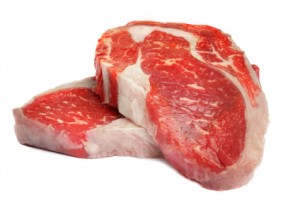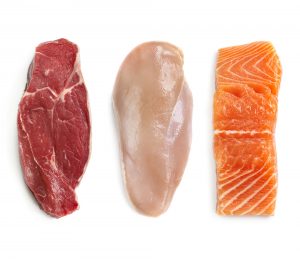Which Proteins Are Best?
Author: Dr. Stephen Chaney
 The ads from the meat lobby say, “Red meat does a body good”. Are the ads true?
The ads from the meat lobby say, “Red meat does a body good”. Are the ads true?
If we consider the health consequences of regularly eating red meat, the answer appears to be a clear, “No”. Multiple studies have shown a link between red meat consumption and:
- Coronary heart disease.
- Stroke
- Type 2 diabetes.
- Colon cancer, prostate cancer, and breast cancer.
And, if we consider the environmental consequences of red meat production, the answer also appears to be, “No”. I have discussed this in a recent issue of “Health Tips From the Professor”.
But what about muscle mass and strength? Red meat is a rich source of protein, and we associate meat consumption with an increase in muscle mass. Surely, red meat consumption must help us build muscle mass and strength when we are young and preserve muscle mass and strength as we age.
This is why the recent headlines claiming that red meat consumption increases the risk of frailty in older women were so confusing. I, like you, found those headlines to be counterintuitive. So, I have investigated the study (EA Struijk et al, Journal of Cachexia, Sarcopenia and Muscle, 13: 210-219, 2022) behind the headlines. Here is what I found.
How Was The Study Done?
 This study utilized data acquired from the Nurses’ Health Study (NHS). The NHS began in 1976 with 121,700 female nurses aged 30 to 55. This study followed 85,871 nurses in the NHS once they reached age 60 for an average of 14 years.
This study utilized data acquired from the Nurses’ Health Study (NHS). The NHS began in 1976 with 121,700 female nurses aged 30 to 55. This study followed 85,871 nurses in the NHS once they reached age 60 for an average of 14 years.
Dietary intake was assessed using a food frequency questionnaire that was administered to all participants in the study every four years between 1980 and 2010. The long-term intake of red meat and other protein sources was based on a cumulative average of all available diet questionnaires for each participant.
The participants also filled out a Medical Outcomes Short Report every four years between 1992 and 2014. Data from this survey was used to calculate something called the FRAIL scale, which includes the following frailty criteria:
- Fatigue
- Low muscle strength.
- Reduced aerobic capacity.
- Having ≥5 of the following chronic diseases:
-
- Cancer
- High blood pressure
- Type 2 diabetes
- Angina
- Myocardial infarction (heart attack)
- Congestive heart failure
- Asthma
- COPD (chronic obstructive pulmonary disease)
- Arthritis
- Parkinson’s disease
- Kidney disease
- Depression
- Greater than ≥5% weight loss in two consecutive assessments.
Frailty was defined as having met 3 or more criteria in the FRAIL scale. The study looked at the effect of habitual consumption of red meat or other protein sources on the development of frailty during the 14-year follow-up period.
Does Red Meat Cause Frailty In Older Women?
 The investigators separated the participants into 5 quintiles based on total red meat consumption, unprocessed red meat construction, or processed red meat consumption. The range of intakes was as follows.
The investigators separated the participants into 5 quintiles based on total red meat consumption, unprocessed red meat construction, or processed red meat consumption. The range of intakes was as follows.
Total red meat: 0.4 servings per day to 1.8 servings per day.
Unprocessed red meat: 0.3 servings per day to 1.3 servings per day.
Processed red meat: 0.04 servings per day to 0.6 servings per day.
Clearly none of the women in this study were consuming either vegan or keto diets. As might be expected from a cross-section of the American public, there was a fairly narrow range of daily meat consumption.
Here are the results of the study:
- Each serving per day of total red meat increased frailty by 13%.
- Each serving per day of unprocessed red meat increased frailty by 8%.
- Each serving per day of processed red meat increased frailty by 26%.
- When each component of the frailty index was examined individually, all of them were positively associated with red meat consumption except for weight loss.
This was perhaps the most unexpected finding of the study. Not only did red meat consumption increased the risk of chronic diseases in these women, which would be expected from many previous studies. But red meat consumption also made these women more tired, weaker, and shorter of breath.
The authors concluded, “Habitual consumption of any type of red meat was associated with a higher risk of frailty.”
Which Proteins Are Best?
 The investigators then asked if replacing one serving/day of red meat with other protein sources was associated with a significantly lower risk of frailty. Here is what they found:
The investigators then asked if replacing one serving/day of red meat with other protein sources was associated with a significantly lower risk of frailty. Here is what they found:
- Replacing one serving per day of unprocessed red meat with a serving of:
-
- Fish reduced frailty risk by 22%.
-
- Nuts reduced frailty risk by 14%.
- Replacing one serving per day of processed red meat with a serving of:
-
- Fish reduced frailty risk by 33%
-
- Nuts reduced frailty risk by 26%
-
- Low-fat dairy reduced frailty risk by 16%
-
- Legumes reduced frailty risk by 13%.
The authors concluded, “Replacing red meat with another source of protein including fish, nuts, legumes, and low-fat dairy may be encouraged to reduce the risk of developing frailty syndrome. These findings are in line with dietary guidelines promoting diets that emphasize plant-based sources of protein.” [I would note that fish and low-fat dairy are hardly plant-based protein sources.]
What Does This Study Mean For You?
 I am not yet ready to jump on the “eating red meat causes frailty” bandwagon. This is a very large, well-designed study, but it is a single study. It needs to be replicated by future studies.
I am not yet ready to jump on the “eating red meat causes frailty” bandwagon. This is a very large, well-designed study, but it is a single study. It needs to be replicated by future studies.
And, as a biochemist, I am skeptical about any study that does not offer a clear metabolic rationale for the results. As I said earlier, increased protein intake is usually associated with an increase in muscle mass when we are young and a preservation of muscle mass as we age. There is no obvious metabolic explanation for why an increase in red meat consumption in older women would cause a decrease in muscle mass and other symptoms of frailty.
On the other hand, there are plenty of well documented reasons for decreasing red meat intake. Consumption of red meat is bad for our health and bad for the health of the planet as I have discussed in an earlier issue of “Health Tips From the Professor”. And substituting other protein sources, especially plant proteins, is better for our health and the health of our planet.
Finally, we also need to consider the possibility that this study is correct and that future studies will confirm these findings. Stranger things have happened.
As we age, we begin to lose muscle mass, a process called sarcopenia. Increased protein intake and resistance exercise can help slow this process. While I am not ready to say that red meat causes decreased muscle mass, I do think this study should make us think about which protein sources we use to prevent sarcopenia. At the very least we should not use age-related muscle loss as an excuse to increase our red meat intake. That might just be counterproductive.
The Bottom Line
A recent study looked at the effect of red meat consumption on frailty in older women. It came to the unexpected conclusion that:
- Each serving per day of total red meat increased frailty by 13%.
- Each serving per day of unprocessed red meat increased frailty by 8%.
- Each serving per day of processed red meat increased frailty by 26%.
- The increase in frailty could be reduced by replacing one serving/day of red meat with a serving of fish, nuts, low-fat dairy, or legumes.
I am not yet ready to jump on the “eating red meat causes frailty” bandwagon. This is a very large, well-designed study, but it is a single study. It needs to be replicated by future studies. And, as a biochemist, I am skeptical about any study that does not offer a clear metabolic rationale for the results.
On the other hand, there are plenty of well documented reasons for decreasing red meat intake. Consumption of red meat is bad for our health and for the health of the planet.
Finally, we also need to consider the possibility that this study is correct and that future studies will confirm these findings. Stranger things have happened.
As we age, we begin to lose muscle mass, a process called sarcopenia. Increased protein intake and resistance exercise can help slow this process. This study should make us think about which protein sources we use to prevent sarcopenia. At the very least we should not use age-related muscle loss as an excuse to increase our red meat intake. That might just be counterproductive.
These statements have not been evaluated by the Food and Drug Administration. This information is not intended to diagnose, treat, cure or prevent any disease.
